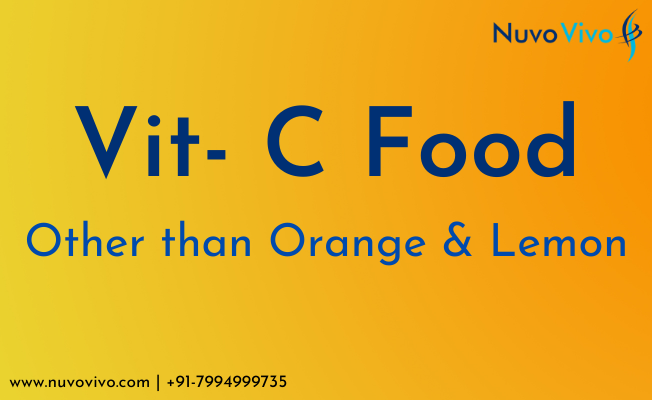Vitamin C or ascorbic acid is an essential nutrient, required for the healthy functioning of the human body. It is essential for the maintenance of blood vessels, good skin, bones, cartilage and it helps in shielding the cells from oxidative stress which is paramount in protecting the body from diseases including cancer. So basically it is the immune booster of our body that aids in protein metabolism, collagen production, and even healing of cuts and wounds. Non-heme iron (found in vegetables such as spinach, lentils, etc), which is important for the body can be absorbed only with the assistance of vitamin c.
Free radicals, formed when our body converts food into energy, can be a reason for rapid aging and such harmful free radicals are neutralized by the antioxidant compound, known as vitamin C. The ill-effects of pollution, smoking, ultraviolet light, etc are also controlled by this vitamin.
Since the human body doesn’t produce enough vitamin c on its own, it should be replenished through diet. As per the gender, pregnancy, and lactation aspects of an individual, the daily requirement of ascorbic acid also differs. For eg: if a healthy male needs 90mg, a female needs only 75mg. But, for a pregnant woman, the requirement is 85mg which increases further to 120mg for a lactating woman.
Is Orange & Lemon (Citrus Fruits) the only source of Vitamin C?
Whenever we hear about vitamin c, the first name that comes up is that of an orange or lemon. We often fail to understand that there are a lot of other fruits and vegetables that are better sources. Even though we all agree that citrus fruits are rich in vitamin c, some of the common fruits and vegetables we use in our day-to-day life are much more potent and excellent options for a vitamin c rich diet.
Here are 10 non-citrus options for Vitamin C, with Percent Daily Value:
1. Guava (100g of guava=254% DV of Vitamin C)
The one fruit which is often given the least importance. It is an excellent source and it helps in improving immunity and heart health. Guava is known to control blood sugar levels so it is apt for diabetic patients as well.
2. Papaya (100g of papaya = 68% DV of Vitamin C)
It is loaded with nutrients and it is best for the skin and collagen production. Papaya aids in weight loss and also helps in improving eyesight, digestion, menstrual pain, and blood sugar levels.
3. Gooseberry (1 cup gooseberry – 46% DV of vitamin C)
Our very own desi amla is an excellent option for vitamin c and other vitamins such as B5 and B6. The rich copper content in gooseberry is important for the immune system, brain, heart and blood vessels. Manganese content helps in metabolism, bone formation and reproduction. For overall health benefits, gooseberry is one among the top contenders
4. Bell peppers (1/2 cup of yellow bell pepper = 153% DV of Vitamin C)
Bell peppers differ in their vitamin c content as per their color; yellow having the highest amount followed by red and green.
5. Kiwi (100g of kiwi = 103% DV of Vitamin C)
It contains almost the same amount of vitamin c as an orange. This subtropical fruit is higher in vitamin C per ounce than most other fruits and it helps in easing issues due to constipation.
6. Broccoli (100g of broccoli = 99% DV of Vitamin C)
It is rich in fiber, phosphorous, potassium in addition to Vitamin C and A. It also contains comparitively more amount of protein. Having broccoli in salads and other recipes will benefit the health to a great extent.
7. Strawberry (100g of strawberry = 65% DV of Vitamin C)
Most berries like raspberries, blueberries, blackberries, and strawberries are excellent sources of antioxidants and dietary fiber along with rich Vitamin C content.
8. Brussels sprouts (1/2 cup cooked = 53% DV of Vitamin C)
In addition to Vitamin C, it is also rich in Vitamin K and Vitamin A just like the other vegetables such as cabbage, kale, and cauliflower.
9. Potatoes (medium baked potato = 40% DV of Vitamin C)
Potatoes are excellent sources of potassium, fiber, vitamin B6, vitamin C, and much more. It helps in controlling diabetes and heart diseases.
10. Tomato (100g of tomato = 25% DV of Vitamin C)
They are rich in micronutrients and are good sources of Vitamin A, Vitamin E, and Vitamin K.
Oranges need not be the only go-to option for a Vitamin C-rich diet as there are a lot of better substitutes available. Acerola cherries, cantaloupe, green peas, cauliflower, spinach, etc are all excellent substitutes. Some of the herbs like thyme and parsley also pack a punch when it comes to Vitamin C. Having a variety of fruits and vegetables rich in Vitamin C and other nutrients will help us lead a healthy and happy life so we must make sure that we include these food options in our daily diet in one way or the other.

